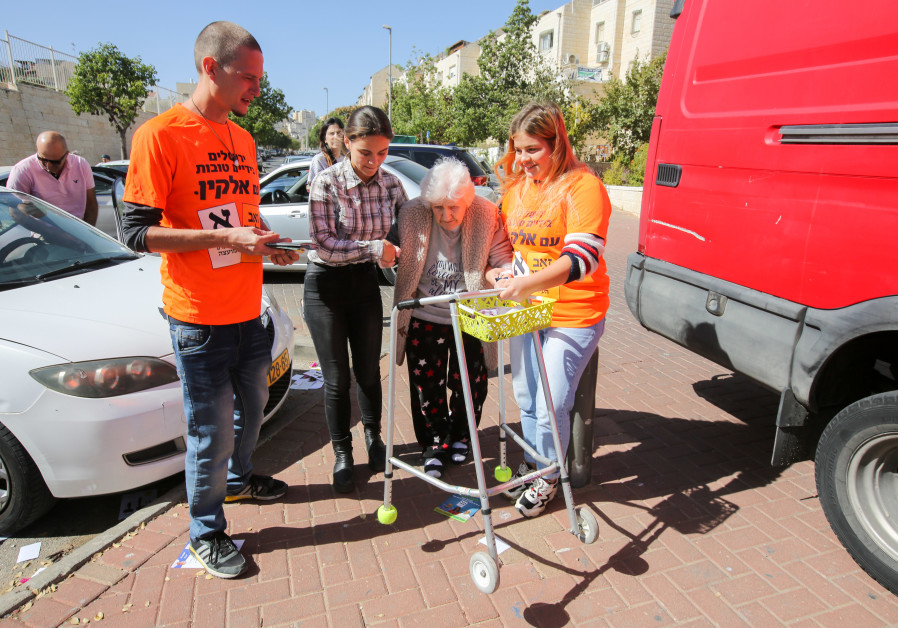In Jerusalem not even mayoral candidates get to cut the line

An elderly lady is helped by campaign volunteers . (photo credit: MARC ISRAEL SELLEM/THE JERUSALEM POST)
Jerusalem mayoral candidate Moshe Lion arrived at Jerusalem’s historic, 160-year-old Tehilla-Evelina Secondary School in the capital’s Rehavia neighborhood hoping to vote quickly, talk to the press, and get back on the campaign trail.
But Lion had no such luck. After giving a couple of interviews, he went to cast his ballot and got told by those in line: “Wait your turn. You are no different than any of the rest of us.”
So Lion waited for an English-speaking elderly couple to vote, followed by a bearded man who made a point of dramatically showing the 20 photographers waiting to take pictures of Lion that he had cast a ballot for Jerusalem Affairs Minister Ze’ev Elkin.
While Lion was waiting and looking bored, a reporter told him: “Don’t worry! The same thing happened to Donald Trump!” Lion regained color in his tired face and excitedly responded “Really? There is more to that comparison.” But then the reporter said no, and Lion returned to waiting in frustration.
A 20-minute drive from there, the Beit Hanina school in the upscale Arab neighborhood of the same name looked abandoned. There was no school on Tuesday due to the election, but police were outside, just in case anyone came to vote.
Inside the four-story school there were only polling station officials who nervously answered calls from the Interior Ministry asking how many people had voted. None so far, the head of the polling station answered, more than five hours after her station opened.
While other polling stations were full of posters of candidates, volunteers from parties accosting every potential voter, and littered with campaign propaganda, the Arab school was just as clean as it was empty.
The fatwa (Muslim religious ruling) issued by the Council of Jerusalem Sheikhs led by Al-Aksa Mosque Sheikh Akram Sabri, forbidding Arabs from voting, appeared to have impacted a sizeable portion of the 180,000 eligible voters of the Arab sector.
As the clock approached 1pm, two voters finally came to cast ballots: One Arab who came to support the Arab party of Ramadan Dabash and a Jew with peyot wearing a Breslav Hasid style kippa. Neither agreed to be photographed.
When mayoral candidate Ofer Berkovitch finished voting at a polling station close to Lion’s, the foreign press asked Berkovitch what he thought of the Arab boycott of the race.
“In a democracy you should act and you should vote,” Berkovitch said. “I want all citizens to be a part of the city. Whether or not they vote, I will work for these citizens also. I am going to push forward services to east Jerusalem, to invest much more there and to enforce the law. We are going to hold and control all of Jerusalem for all the citizens of Jerusalem.”
Across town, in Jerusalem’s Pisgat Ze’ev neighborhood, the same school got visited by Elkin and his fellow mayoral candidate Yossi Daitch. The two had also seen each other hours earlier when they both went to pray at the Western Wall. Elkin admitted to being star-struck by the Wall.
“I first saw a story about the Wall when I was 14 where I grew up in Kharkov (currently in Ukraine, then in the USSR),” Elkin recalled. “Who knew then that I would one day come to the Wall as a cabinet minister and a candidate for mayor of Jerusalem?”
Join Jerusalem Post Premium Plus now for just $5 and upgrade your experience with an ads-free website and exclusive content. Click here>>






Comments are closed.